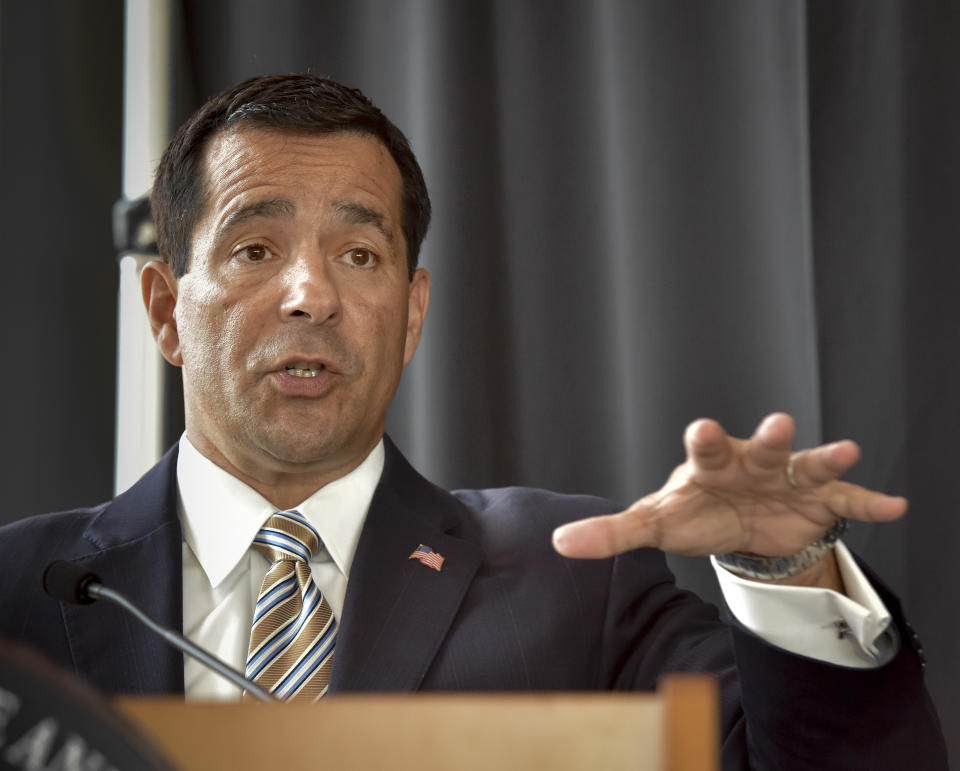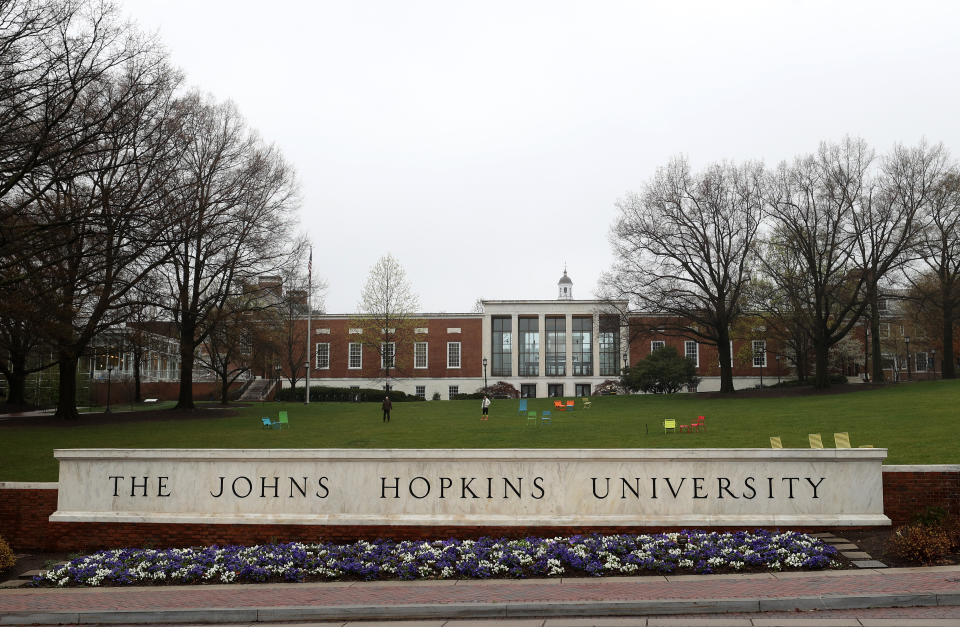Intelligence community warns Russia wants to hurt Biden, while China 'prefers' Trump not be reelected
WASHINGTON — Following a push from Democratic lawmakers to be more forthcoming in releasing evidence of foreign interference in the upcoming U.S. presidential election, a top counterintelligence official on Friday afternoon released new details about this threat, including an assessment that Russia is targeting former Vice President Joe Biden, while China is concerned about a second term for President Trump.
The intelligence community has concluded, based largely on public rhetoric from Chinese officials on issues like the global response to the coronavirus pandemic and the battle over technologies like 5G and social media, that China currently “prefers that President Trump — whom Beijing sees as unpredictable — does not win reelection,” said Bill Evanina, director of the National Counterintelligence and Security Center, in a statement.
On the other side, Russia is seeking to “denigrate former Vice President Biden,” consistent with Moscow’s view of his role during the Obama administration, wrote Evanina. He cited as an example pro-Russian Ukrainian parliamentarian Andriy Derkach, who has leaked phone calls involving Biden’s work in Ukraine, a subject being investigated by Republicans on the Senate Homeland Security Committee.
The intelligence community is also tracking Iranian efforts to “undermine U.S. democratic institutions” primarily through spreading disinformation online, motivated by a fear that President Trump’s reelection “would result in a continuation of U.S. pressure on Iran in an effort to foment regime change.”
Evanina predicted that foreign adversaries, primarily Russia, China and Iran, “will continue to use covert and overt influence measures in their attempts to sway U.S. voters’ preferences and perspectives, shift U.S. policies, increase discord in the United States, and undermine the American people’s confidence in our democratic process.”
However, he noted that it will be challenging for enemies to tamper with voting results “at scale.”
The new release marks the most detailed disclosure from the intelligence community so far about the threat posed by foreign countries as the November election approaches. It’s unclear whether it will satisfy Democratic lawmakers who have been demanding increased transparency.
Shortly after Evanina released the new information on Friday, Sens. Marco Rubio, a Republican from Florida and acting chairman of the Intelligence Committee, and ranking member Mark Warner, a Democrat from Virginia, published a joint statement lauding the new disclosure, describing it as a step that “moves us closer” to the goal of publishing “as much information about foreign threats to our elections as possible.” However, Rubio and Warner stressed that they believe “more information that was made available” in briefings to lawmakers “can, and at the appropriate time should, be shared with the voting public.”
Specifically, during an online interview at the Aspen Security Forum on Thursday, Warner had requested that the intelligence community release information “about some of the Russian disinformation campaigns that are taking place right now.” Evanina’s new statement, in addition to mentioning the leaked phone calls on Ukraine, mentioned that “some Kremlin-linked actors are also seeking to boost President Trump’s candidacy on social media and Russian television,” but did not go into further detail on specific issues or talking points that Russian accounts are backing.

Warner has not been alone in demanding more information.
Providing the specific false or misleading talking points that foreign networks are pushing would help voters distinguish between what’s classic political mudslinging and what’s foreign meddling, they argue. “I remain very concerned information is being withheld from the public that could help voters distinguish legitimate political speech from foreign propaganda,” tweeted Sen. Chris Murphy, D-Conn., after emerging from a classified briefing from Director of National Intelligence John Ratcliffe on Monday.
The administration has not been silent on the issue of election interference.
Prior to the newest release, which Evanina described as “the most current, accurate, and objective election threat information the IC has to offer in an unclassified setting at this time,” Evanina published a more broad statement about protecting elections. On July 24, roughly 100 days before the election, he detailed the broad contours of the foreign threat.

Evanina acknowledged on Friday that he expects lawmakers and the public to continue to demand “more information as the election approaches,” and promised to continue to track the threats, brief relevant officials, and disclose what he is able to.
Additionally, the State Department on Wednesday released a 77-page new report on “Russia’s Disinformation and Propaganda Ecosystem,” including recent details about foreign campaigns to distort the facts about the coronavirus pandemic and other recent events. On the same day, the State Department also offered a reward of up to $10 million for “information leading to the identification or location of any person who works with or for a foreign government for the purpose of interfering with U.S. elections through certain illegal cyber activities.”
Meanwhile, officials at the Cybersecurity and Infrastructure Security Agency, a part of the Department of Homeland Security created in 2018 to respond to growing cyber threats, have published updates and resources about election security for state and local election officials, including ways to report suspected vulnerabilities and dangers to DHS.
The push for more openness, from both politicians and the public, is something the intelligence community has grappled with for years as it attempts to balance protecting secrets while also communicating threats to policymakers.
“The [intelligence community] is used to being pushed to reveal information of high political interest and with significant partisan implications,” wrote Mark Stout, an intelligence historian and program director for global security studies at Johns Hopkins University in an email to Yahoo News. “We saw this in connection with 9/11 and the Iraqi weapons of mass destruction debacle, to choose two particularly prominent examples.”

Top officials conceded after the 2016 U.S. presidential election that despite releasing a public warning about Russian interference in October, the intelligence community was unprepared to counter Russia’s attacks and to fully inform the public. Since then, U.S. intelligence agencies have bulked up efforts to defend the elections from all sides — whether that’s on social media, through voting machinery, or in the inboxes and private communications of politicians. Those efforts led to what intelligence officials have described as a largely successful push to protect the 2018 midterm elections.
But 2020, a presidential election year fraught with political and social upheaval, is putting those systems to the test.
Beyond interest in transparency, the demand for information is an inherently political one. Democratic lawmakers fear the White House might try to suppress information that would damage President Trump’s chances for reelection. So far, however, Evanina and other intelligence officials appear to have a fair amount of freedom in sharing information with Congress and state and local officials, including making some public statements.
The Democrats’ recent urgings come at the same time GOP lawmakers on the Homeland Security Committee are pushing an investigation into presumptive Democratic nominee Joe Biden and his involvement in Ukraine. Sen. Ron Wyden, a Democrat from Oregon on the Intelligence Committee, has described those efforts as an attempt “to chase right-wing conspiracy theories,” potentially with the help of foreign officials.
The intelligence community will have to walk a fine line, taking into account a push for transparency, the political implications of disclosures, and the need to protect classified information.
Ronald Marks, a former senior CIA official, told Yahoo News that even though this is a particularly challenging moment for the intelligence community, its leaders have to do everything they can to declassify evidence of attempted interference. “Everything is now political,” he said, adding that intelligence officials will be accused of hiding information no matter what they do.
“But at this stage of the game,” he said, “I think they’ve got to be as full and as open as they can possibly be.”
Cover thumbnail photo: Jessica McGowan/Getty Images
_____
Read more from Yahoo News:


